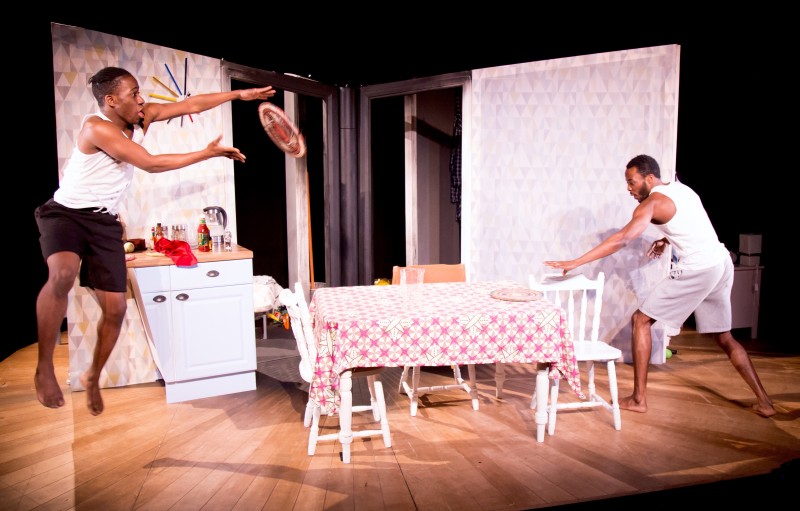 Two robust, muscular, black men compete on a Nintendo Wii as the audience trickle in, feeling like voyeurs entering someone else’s home. Performers Soloman Israel and Samuel Nicholas inhabit a comfortable and homely set, designed on an axis, cleverly incorporating two bedrooms, a bathroom, and a kitchen. The partitions come to a point at centre stage where figures weave in and out of doors and openings that reveal intimate night time scenes and hide them when the break of daylight transforms transparent gauze windows into opaque wallpaper. A stopped clock reminds us both of the transience of time and of time standing still within these four intercepting walls.
Two robust, muscular, black men compete on a Nintendo Wii as the audience trickle in, feeling like voyeurs entering someone else’s home. Performers Soloman Israel and Samuel Nicholas inhabit a comfortable and homely set, designed on an axis, cleverly incorporating two bedrooms, a bathroom, and a kitchen. The partitions come to a point at centre stage where figures weave in and out of doors and openings that reveal intimate night time scenes and hide them when the break of daylight transforms transparent gauze windows into opaque wallpaper. A stopped clock reminds us both of the transience of time and of time standing still within these four intercepting walls.
The strongest character in the piece is the absent mother, whose voice by Michelle Asante echoes through an answer phone recording. We follow father and son (Israel and Nicholas) through a linear narrative of grief, written and directed by Natalie Ibu. Each scene depicts a recollection of memories and the difficulty in attempting to carry out an everyday chore whilst burdened by intense emotion. Father and son perform in parallel, either in entirely opposing worlds, unintentionally disrupting each other’s routines, or working together in mutual appreciation of their personal journeys.
The narrative carefully depicts scenes that anyone who has any sense of love or loss will easily recognise in their own stories. Making the table for dinner, boiling the kettle for tea, and going to bed are moments that are chosen thoughtfully for their mundane banality and framed as absolute hurdles to be overcome through new ritualistic habits. Particular movements are highlighted by an intuitive soundtrack that projects the everyday into extreme focus. Helen Skiera’s composition of worldly noises and abstract sounds invoke the piercing enormity of simple actions that forms a constant theme throughout.
A powerful dance solo by Nicholas emerging from washing in the bathroom is charged with energy as we watch a sudden burst of sharp isolations from behind. Cleansing turns into fighting as repetitious washing gestures, jumps, and leaps fill the spot where he stands before the mirror with a sense of bursting frustration. Repeating this for longer might allow a tiny snapshot to become more powerful. The breathy, rhythmic, beat-boxing panic attack ends before it becomes scary or absorbing. The stark reminder of death by drawing around objects with white chalk happens only once. Staccato isolations performed in silhouette behind the gauze, the rearranging of the table, the use of sign language, all burst with complex everyday and dance vocabularies that are intriguing to watch, full of content, and over all too quickly, before they fully transform into ritual.
The best and most poignant moments in this piece are sporadic, making it feel bitty and over descriptive, when Israel and Nicholas have the physicality and expressive qualities to perform to a more physical extreme and point of exhaustion. A shift away from naturalism and towards the physical embodiment of emotion and ritual, already there in the dance phrases, would take this piece to a powerful, unsettling, unnerving and emotive highpoint. Take away the set, limit the endless props to a sheet, a mug, and a piece of white chalk, and set the task of performing the entire piece with the body – two men, two solo figures, one duet. This would transform the work from a naturalistic interpretation with a splattering of movement to one that maximises the emotive content of the complex physical vocabulary already there.
As it stands, i know all the secrets in my world describes with humour and care the isolation and ownership of pain. Through disruption of each other’s rituals, each character’s pain is their own. Pain is timeless, chronic, but passable with humour, humanity, and a father/son bond. Israel’s powerful duet as father with his wife’s dress draws the piece to a memorable close. Washing, wearing, fighting, worshiping, carrying, wringing, screwing up, and finally cloaking himself in this white cotton shift: father dons the wings of an angel or the cloak of a superhero and finally manages to lay the table with his son.

